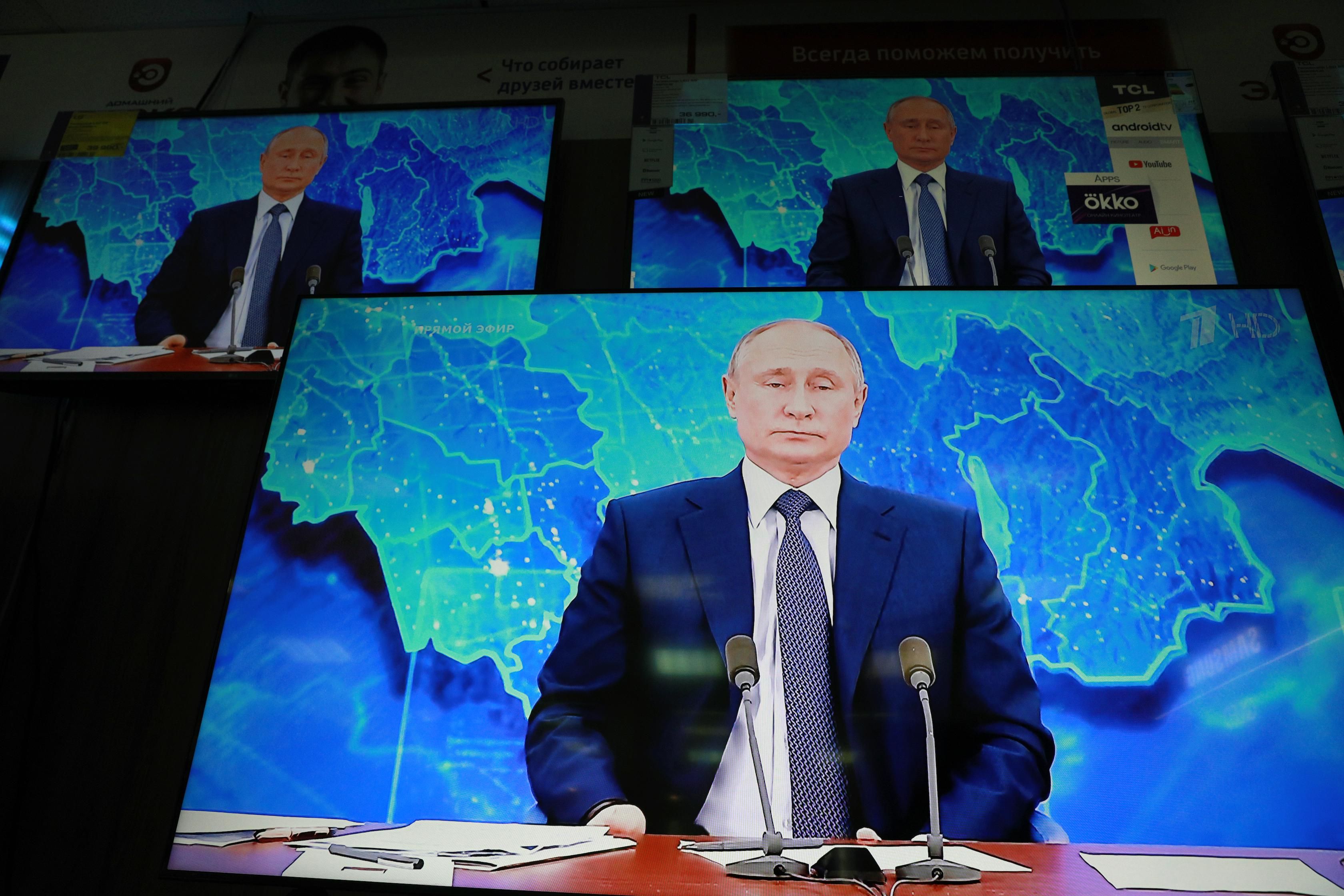December 28, 2021
Thirty years ago this week, Soviet leader Mikhail Gorbachev, forced to choose between dissolving the USSR or trying to hold it together by force, decided to lower the flag and end 75 years of Communist rule. Boris Yeltsin became president of something called the Russian Federation, and the Cold War officially passed into history. Many on both sides of the old divide hoped for a clean break from a confrontational past and looked forward to a new, cooperative future.
Three decades later, how much has changed? There is no question that Russians enjoy a higher standard of living, opportunity, and freedom than during the Soviet period. They can travel. They can read the news from a world away at a moment’s notice. They can enjoy Michelin-starred farm-to-table restaurants and swanky art exhibitions in a smart new Moscow that bears little resemblance to the drab Soviet capital of the last century.
And yet, President Vladimir Putin is now railing at NATO and threatening military action against Ukraine to protect Russia’s sphere of influence. Putin’s most prominent opponent languishes in prison, a year after being poisoned, likely by state officials. And this week, the state shuttered a homegrown human rights group dedicated to cataloging the Soviet regime’s human-rights abuses.
So is Vladimir Putin – a former KGB agent who once called the Soviet collapse the “greatest geopolitical tragedy” of the century – trying to reconstitute a new vision of the old hammers and sickles?
That question misses a longer historical sweep that Putin is part of.
Russia has, since the 18th century, led an empire. It’s a sprawling land empire that is hard to keep together and hard to defend – the Russian winter has repeatedly stepped in to help where mountain ranges or waterways could not – but an empire nonetheless.
For two hundred years, being a great power through imperial clout has been central to Russian leaders’ understanding of what Russia is: from the czars to the Soviets and now to… what? The “phantom pain of a lost empire,” as the syndrome has been called, is a powerful thing.
The thing is, Russia today is smaller than it’s been in 200 years. It lacks the allies that the Soviets had – after all, it’s now Ukraine, not West Germany, that’s living in the shadow of Kremlin threats. It lacks the global ideological appeal that the USSR enjoyed. And, of course, it lacks Ukraine. That’s a problem for imperial Russia because – as Putin tells it, and many Russians agree – Ukraine is a critical and inseparable part of the broader Russian world. Without Ukraine, Russia is, as Putin sees it, just another country.
So when Putin squabbles with the West about where NATO’s borders should end – and the countries squashed dangerously between Russia and Germany can fairly ask why he should get to decide that for them – he is acting on that imperial impulse.
When he claims to be encircled by a NATO that is present across just a tiny fraction of Russia’s immensely long borders, he is expressing the same geopolitical insecurity that kept empresses and czars, commissars and general secretaries awake in the Kremlin for centuries.
The question is whether that vision is sustainable for a Russia that is arguably weaker, globally, than it’s ever been. A Russia of modern people but without a modern innovative economy. Is empire (re)building worth the cost for a Russia that might otherwise be a great country without being a great power? Thirty years after the collapse of the Soviet Union, the answer to that question seems as distant as ever.
From Your Site Articles
- After Kazakhstan, how will Russia escalate in Ukraine? - GZERO Media ›
- Signs of Russian climbdown following Macron-Putin meeting - GZERO Media ›
- Ukraine is fighting for all of us, says Estonia's former president Kersti Kaljulaid - GZERO Media ›
- Global Stage ›
- Russia-Ukraine war: How we got here - GZERO Media ›
- Podcast: Examining Putin: his logic, mistakes, and hope for Ukraine - GZERO Media ›
- Putin has "mummified" Russia: Ivan Krastev On the Putin Effect - GZERO Media ›
- Putin past the point of no return - GZERO Media ›
- Mikhail Gorbachev outlived his legacy - GZERO Media ›
- Putin cornered - GZERO Media ›
- Podcast: David Petraeus on Putin's war games - GZERO Media ›
- "Peace" under authoritarian occupation isn't peaceful: Estonia's Kaja Kallas - GZERO Media ›
- Russia vs. NATO: Heightened risk of war - GZERO Media ›
- Putin miscalculated on Ukraine, misled by post-Cold War worldview, says Ivan Krastev - GZERO Media ›
- Mitt Romney interview: DC dysfunction, Russian attacks and banning TikTok - GZERO Media ›
- Putin only understands power and force, says Finland’s former PM - GZERO Media ›
More For You
Bad Bunny during the Super Bowl LX halftime show press conference at Moscone Center.
Kirby Lee-Imagn Images
100 million: The number of people expected to watch the Super Bowl halftime performance with Bad Bunny, the Puerto Rican superstar and newly minted Album of the Year winner at the Grammys.
Most Popular
Think you know what's going on around the world? Here's your chance to prove it.
- YouTube
An imminent US airstrike on iran is not only possible, it's probable.
Americans are moving less — and renting more. Cooling migration and rising vacancy rates, especially across the Sunbelt, have flattened rent growth and given renters new leverage. For many lower-income households, that relief is beginning to show up in discretionary spending. Explore what's changing in US housing by subscribing to Bank of America Institute.
© 2025 GZERO Media. All Rights Reserved | A Eurasia Group media company.
